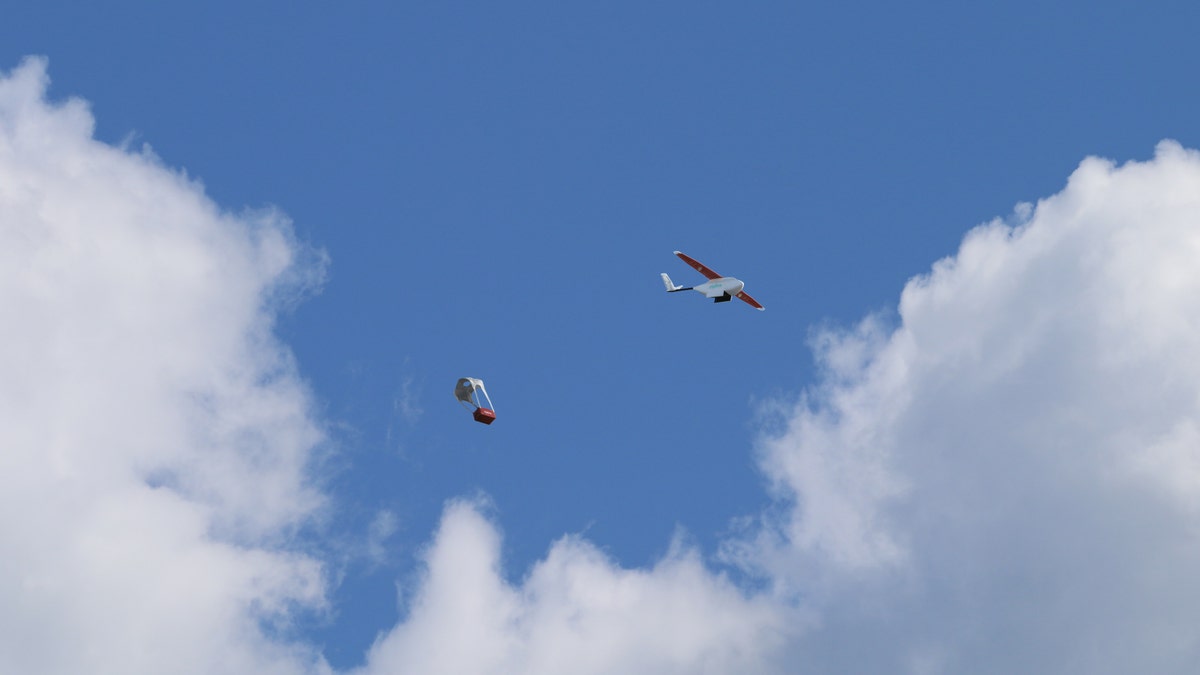
(Zipline)
A California-based start-up is building drones to drop medical supplies in some of the most remote areas of Rwanda, putting the emerging technology where it can do some real good.
Here’s the challenge, according to Zipline International, a Silicon Valley robotics start-up that is developing and building the drones: somewhere in the neighborhood of two billion people lack adequate access to essential medical products because they live in inaccessible areas. As a result, almost 3 million children under age five die every year.
Enter Zipline. Initially, the company's drone service is slated to deliver blood to 21 transfusion clinics across the western half of Rwanda, one of the poorest nations in the world. Then it will expand service to the remainder of the country in early 2017, Justin Hamilton, a company spokesperson, said. This will make deliveries possible twice a day, a stark contrast to many remote centers across the world, where deliveries are often done just twice a year.
Related: Hidden high-tech ocean pods will unleash Naval drones
Zipline’s team, comprised of aerospace veterans who worked at SpaceX, Google, Boeing, and NASA, has designed and manufactured a custom-built airplane that weighs approximately 22 pounds, flies autonomously, and can carry 3.3 pounds of medicine and can reach distances of 75 miles round-trip on a single battery charge.
Most previous attempts at drone delivery services have used “off-the-shelf, hobbyist quadcopters,” according to Zipline. These vehicles have limited flight ranges, often fail or crash unpredictably, and can only operate in perfect weather, Zipline said.
The drones operate out of “nests.” Each Nest is comprised of 15 Zip drones and deliveries are made by descending close to the ground and air-dropping medicine to a spot near the targeted health centers. Flight plans are changed by swapping out SIM cards, Hamilton said.
All of this is necessary because typically many drugs (insulin, vaccines, etc.) can’t be delivered unless the health center has reliable refrigerators, which is rare in remote areas. And many lifesaving medicines, such as rabies prophylaxis and antivenin, are not kept in stock because “there is no way to accurately predict demand ahead of time. Approximately 24,000 people die annually across the continent of rabies alone,” Zipline said.
Related: Cool robot hand learns as it goes
“We’ve built an instant delivery system for the world, allowing medicines and other products to be delivered on demand and at low cost, anywhere,” Zipline CEO Keller Rinaudo said in a statement.
Zipline also announced a partnership with the UPS Foundation and Gavi, a global vaccine alliance, that will study the Rwandan operation and come up with a plan to scale to additional medicines and vaccines in that country faster.
“The hope is the knowledge gained through that process can help countries around the world [start up] similar efforts much faster,” Hamilton said.
Related: New VR film will take viewers inside Anne Frank's hiding place
“It’s about the technology but it’s also equally about the resources that both UPS and Gavi can bring to the partnership, with deep expertise in supply chain and cold chain from UPS,” Glenn A. Zaccara, a UPS spokesperson said, referring to keeping blood and vaccines cold because they are temperature-sensitive.
“And… Gavi brings a focus on developmental aid and vaccines on a global scale and cold chain expertise. It’s a powerful public-private partnership designed to save lives," Zaccara said.








































